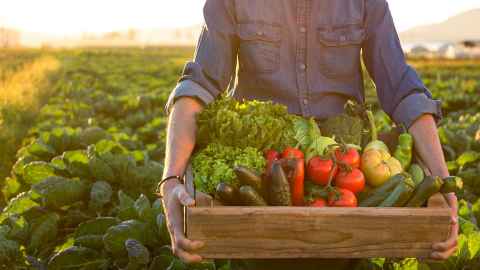An organic future for food sustainability
19 June 2019
Opinion: Organic farming fits well into discussions on sustainable food production and consumption but it falls off the radar in New Zealand, says Julia Schmack.

It didn’t rate a mention at a recent seminar I attended on sustainability, science, society, water, food production and consumption. I wanted to hear about pragmatic approaches larger than local guerrilla gardening initiatives and practical enough not to be forgotten as some idealist’s dream. After the fourth talk, I was still waiting to hear this one term: organic agriculture.
True, there is a lot of scientific evidence for and against organic farming but, despite the controversy, I was surprised it wasn’t mentioned in the discussion of “sustainable food production and consumption”. Do Kiwis still doubt the credibility of organic certification? Are most thinking “in New Zealand, everything used to be organic and that’s why we don’t need this organics fuss”? Or are organics still considered elite products for health freaks and people with pockets deeper than PhD students?
Here’s the definition of organic agriculture by the International Federation of Organic Agriculture Movements, a long-established umbrella organisation for organic food production: “Organic agriculture is a production system that sustains the health of soils, ecosystems and people. It relies on ecological processes, biodiversity and cycles adapted to local conditions, rather than the use of inputs with adverse effects. Organic agriculture combines tradition, innovation and science to benefit the shared environment and promote fair relationships and a good quality of life for all involved.”
Sounds rather far-fetched, doesn’t it?
Well, it’s not. We are bound to make mistakes when we try to improve conventional systems and be disproportionately criticised for not being perfect. This is too often the case when it comes to organic farming. There are logical benefits for biodiversity and animal welfare on organic farms compared to conventional farms. However, scattered cases of fraud have caused people to mistrust the entire movement and, unfortunately, revert to the comfort of the status quo.
I worked at the Research Institute for Organic Farming in Frankfurt for three years and there are things in organic agriculture I disagree with such as the transport of organics over thousands of kilometres. It would be a lot more sustainable to eat local and seasonal. I also disagree with working conditions on organic farms that rely on the hard labour of volunteers, but I understand that surviving as an alternative system in an economy ruled by stock markets is not easy. I also don’t like that, in any kind of agriculture, baby cows get taken away from mothers so we can pump their milk into plastic bottles only to let it ferment in the communal fridge.
...if I were a cow, pig, or chicken, and I could choose between the two farming systems, I know which farm I would choose. 100% the organic farm!
But despite these critiques, after visiting some 60 organic and conventional farms and meeting the farmers, there is one thing that I can say for certain: if I were a cow, pig, or chicken, and I could choose between the two farming systems, I know which farm I would choose. 100% the organic farm! The same goes if I were an earthworm, bird or plant. If I were a weed, the organic farmer wouldn’t be allowed to spray me with nasty chemicals. They would have to use less invasive and often more time intensive methods. But this is what you get when you pay that extra dollar.
But people need to feel confident when they are paying “that extra dollar” and one of the issues for the New Zealand public is the confusion around certification systems: For example, the ‘free range chicken’ that gets an hour of daylight and is still called ‘free range’. It’s easier to throw your hands in the air and claim “well, who really knows” rather than inform yourself – but on the Ministry of Primary Industries website you can read up on organics in NZ.
Of course, it is up to you what to support with your money, but small decisions make a big difference. In New Zealand, organics are still expensive, but it doesn’t have to stay like this. Remember, a system of supply and demand means a higher demand for produce from the organic sector will bring growth and cheaper prices. In Europe, high demand for organics has resulted in more affordable products along the entire value chain.
You could make a start by trying to buy good quality milk or a plant-based alternative (greenhouse gases emitted to produce one glass of dairy milk are about three times higher than for plant-based alternatives).
On a larger scale, New Zealand is already successful in exporting high-end organic products, but we need more of these sustainable foods in our schools, kindergartens, universities, hospitals, and defence forces. This would have a huge impact on demand.
And what about the farmers? Taking money from big corporations and investing it with farmers who have a sustainable vision of agriculture is a simple and practical step to a more inclusive organic future. It would make a big difference for farmers to have the backing of an entire institution and it makes a statement: we want our food to be produced sustainably and we invest in those with the best outcomes for all levels of sustainability, economy, ecology and society!
So let’s do it! Let’s make a change by investing in good (but not perfect) ideas.
Julia Schmack is a doctoral candidate in Biological Sciences at the University of Auckland.
This article reflects the opinion of the author and not necessarily the views of the University of Auckland.
Used with permission from Newsroom An organic future for food sustainability on 19 June 2019.